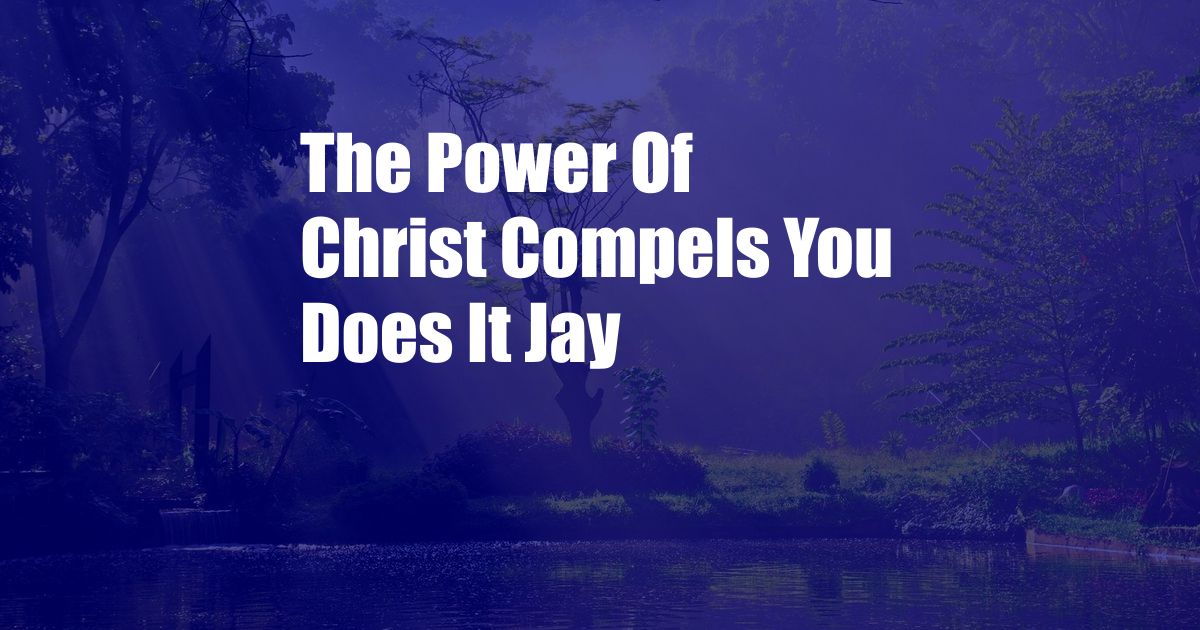
**The Power of Christ Compels You: A Dive into the Exorcism**
In the realm of the supernatural, the act of exorcism has captivated human imagination for centuries. From ancient rituals to contemporary encounters, the concept of casting out evil spirits has been a subject of both fascination and skepticism. In this article, we delve into the depths of exorcism, exploring its definition, history, and the latest developments in this enigmatic field.
Exorcism is the practice of expelling an evil spirit or supernatural presence from a person or place. It is often performed by religious figures such as priests, shamans, or spiritual healers. Throughout history, exorcism has been practiced across various cultures and religions, demonstrating its universal appeal.
**The History of Exorcism**
The concept of exorcism has roots in ancient civilizations. In Mesopotamia, for instance, priests performed “exorcisms” to appease angry gods or ward off evil spirits. Ancient Egyptians believed in the power of amulets and incantations to protect against demonic possession. In the New Testament, Jesus Christ himself is depicted performing exorcisms.
During the Middle Ages, exorcism became a common practice within the Catholic Church. The development of the Catholic Exorcism Ritual in the 17th century formalized the process and provided detailed instructions for priests conducting exorcisms.
**Understanding the Process of Exorcism**
Exorcism involves a series of rituals and prayers aimed at driving out evil spirits. The process typically begins with a diagnosis, where the priest or spiritual healer attempts to determine the presence of demonic possession. This may involve observing the person’s behavior, listening to their testimony, and conducting a physical examination.
If possession is confirmed, the exorcist will begin the exorcism ritual. This involves the use of prayers, holy water, crucifixes, and other religious objects. The exorcist may also engage in dialogue with the possessing spirit, attempting to reason with it or command it to leave. The exorcism process can be lengthy and may take place over several sessions.
**Latest Trends in Exorcism**
In recent years, the practice of exorcism has undergone significant changes. The influence of alternative spiritual traditions and the rise of non-religious exorcists have challenged traditional approaches. Additionally, advancements in psychology and neuroscience have shed new light on the nature of demonic possession and its potential links to mental illness.
Some experts suggest that exorcism can be a form of therapeutic intervention, helping individuals process trauma or cope with psychological distress. Others emphasize the importance of respecting cultural and religious beliefs in the practice of exorcism.
**Tips and Expert Advice**
If you believe you or someone you know may be experiencing demonic possession, it is crucial to approach the situation with caution. Here are some tips and expert advice:
- Seek professional help: Consult with a qualified mental health professional or religious figure to assess the situation and determine the appropriate course of action.
- Respect cultural and religious beliefs: Be mindful of the religious or cultural traditions of the person experiencing possession. Seek guidance from those who are knowledgeable in these practices.
- Avoid self-exorcism: It is highly discouraged to attempt to perform an exorcism on yourself or others without proper training or guidance.
**FAQs on Exorcism**
Q: What are the signs of demonic possession?
A: Potential signs of demonic possession may include unexplained physical symptoms, behavioral changes, speaking in unknown languages, and a sense of being controlled by an external force.
Q: Is exorcism effective?
A: The effectiveness of exorcism is a matter of debate. While some individuals report experiencing relief after an exorcism, others may not find it to be helpful. It is important to note that exorcism is not a substitute for professional medical or psychological treatment.
**Conclusion**
The power of Christ compels you is a thought-provoking exploration into the enigmatic realm of exorcism. From its ancient origins to contemporary practices, exorcism remains a captivating and controversial topic. While it is impossible to definitively prove or disprove the existence of demonic possession, the experiences of those who claim to have witnessed or undergone exorcism continue to fuel our fascination with this mysterious phenomenon.
The Power of Christ is a powerful statement of faith and authority. Are you interested in learning more about exorcism? Let us know in the comments below!